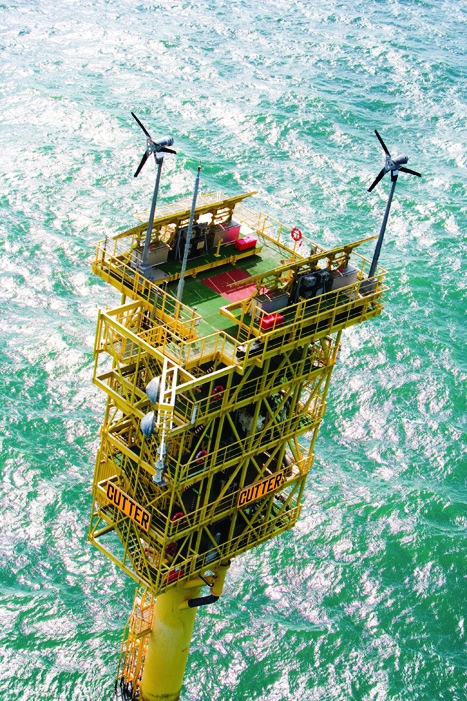Click here to view the latest opportunties in the oil and gas sector
This year’s budget was hailed by chancellor George Osborne as ‘an advertisement for investment and jobs in Britain’. For the oil and gas sector, it was confirmation that the government would support the industry in difficult times.
Osborne’s measures included a £3bn new field allowance for large and deep fields to open up west of Shetland - the last area of the basin left to be developed. The move was designed to encourage billions of pounds of investment in the North Sea, where production has been falling since 1999.

According to Oil & Gas UK, the tax allowances will lead to an extra £50bn being pumped into the industry, resulting in the recovery of an additional 1.7 billion barrels of oil and gas. This, it said, would stimulate the need for more highly skilled engineers in a sector that currently contributes £8bn a year to the exchequer. However, it added that the public’s perception of the industry is often distorted and that more needs to be done to make engineers aware of the opportunities available. It claims that too many people outside key industry centres, such as Aberdeen and the north east of England, are unaware of the importance of the oil and gas sector in the UK economy.
The reason I’ve stayed in the industry for more than 30 years is because it is endlessly challenging
The Offshore Petroleum Industry Training Organisation (OPITO) confirms this in its latest Labour Market Intelligence survey, which reported that 66 per cent of contractors and 62 per cent of operators found it challenging to recruit skilled engineers in the sector. Further anecdotal research from OPITO suggests that the main shortage in industry exists in recruiting experienced workers. ‘We’ve seen this trend in our recruitment activities,’ said Steve Thompson, engineering manager for Shell UK. ‘There is not a shortage coming in at a graduate level - the quality is quite high - but the industry has a gap in the mid-experience range… That’s an area where, certainly in the last few months, we’ve recognised the need to go out and be more active.’
Shell is currently looking to recruit from other industries where engineers can transfer their skills to oil and gas. Thompson highlighted defence as an area where the group has had recent success in attracting engineers with high-technology backgrounds. He claims that once in oil and gas, most engineers feel they do not want to transfer elsewhere.
OPITO is attempting to cement this skills transfer by running transformation training programmes, which use a competence-based approach to up-skilling experienced workers. ‘It is an excellent way to get much-needed experience into industry quickly, fulfilling one of the sector’s key identified skills priorities, although to date the initiative has only been used at technician level,’ said managing director of OPITO UK Larraine Boorman.
‘It is a reality that other sectors are competing for the same skills,’ she added. ‘There is big competition for skills from the nuclear and power sectors as well as decommissioning. As an industry we need to make sure the potential talent sees us as an attractive career option.’

Thompson believes there is much to attract engineers into the sector. ‘The reason I’ve stayed in the industry for more than 30 years is because it’s endlessly challenging,’ he said. ‘It’s very stimulating and interesting and there is a real sense of making a contribution. If you take a global view and look at the rising demand for energy, we have huge technical challenges we need to meet, and all of this is making it a hugely stimulating field to work in.’
For engineers who choose to work in the sector, the financial rewards can be attractive. According to the Oil and Gas Global Salary Guide 2012, industry professionals in the sector enjoy average salaries of £55,850 per annum - more than twice the national salary average of £26,244. The guide also suggests that contractors in the North Sea are among the best paid anywhere in the world.
Boorman said: ‘Oil and gas engineers are constantly inventing new technologies to extract oil from increasingly deeper levels beneath the Earth’s surface. In order to achieve this, engineers are trained to be the best in their field and there are excellent opportunities for career progression.’
With the government’s latest tax allowances for the sector, the industry is now set to develop fields that would otherwise have been uneconomic. The jobs and opportunities this will bring will have a huge impact on skilled UK engineers interested in working in the sector.
‘The engineers we employ in the UK are working on some of the most complex projects we have,’ said Thompson. ‘It’s very much UK-based expertise working on a lot of interesting projects in other parts of the world… We hope the message gets out there that engineers in this sector can make a real difference.’
Click here to view the latest opportunties in the oil and gas sector
Recruiter Viewpoint
SimonDrysdale
Head of upstream human resources, BP
The oil and gas industry is enjoying a much-publicised boom. The sector has benefited from high oil prices over the past five years or more and this, coupled with an ever-increasing demand for energy, has led to a marked increase in oil and gas production volumes.
Many people ask me why engineers should choose the oil and gas sector and what opportunities the sector offers. My answer is always the same: the oil and gas sector is at the frontier of engineering challenges and technical complexity. There are not many other industries, except maybe astronautics and space engineering, which offer technical challenges of the same nature. I mention this sector as we have recently recruited a safety engineer, Jim Weatherbee, from NASA, where he commanded five spaceflight missions, and he believes the two industries are similar in terms of the technical challenges we face.
Our leading engineers could find themselves working with high-pressure reservoirs at depths of 10,000m under the seabed, or in water 1,500m deep where there is no light, air and very little marine life. Alternatively, they could find themselves working in some of the harshest natural environments known to man, from Alaska to Russia, all in an effort to deliver the heat, transport and light that people in modern society need to survive. For those who love to be intellectually challenged, the sector offers both rising stars and established professionals the possibility of a long and successful career that is likely to span the globe and a reward package that is very competitive.
The oil and gas industry is at the frontier of engineering challenges and technical complexity
Alongside the industry boom, a great deal of publicity has been given to the so-called ‘skills gap’ or ‘talent shortage’. The fact is that demand for highly skilled oil and gas professionals has outstripped supply. This is especially true for engineers who are the lifeblood of the oil and gas sector. A maturing workforce, a lack of investment during the 1990s and early 2000s and an increase in science, technology, engineering and maths graduates choosing a career in the City versus the oil and gas industry - these have all been contributors to the situation we face.
To put this ‘talent shortage’ in perspective, last year BP took on around 6,000 people globally, and nearly 1,000 of these were university graduates. In 2011 we took on 630 engineers across the UK and that recruitment will increase further in 2012 as we develop our UK workforce and employees are posted in the UK and elsewhere across the BP portfolio. The company is committed to developing and nurturing young talent to ensure we have the skills and knowledge we need for years to come. This hiring reflects the growth that BP, and the sector as a whole, is seeing. Last year was our best for a decade in terms of gaining access to new acreage; we signed major landmark deals in new oil and gas markets such as Angola and Brazil. Now we need to find and recruit the talent to bring these major opportunities on stream.
Technology has also been a key influencer in the need to recruit. Advances in areas such as subsea engineering has meant that the sector can now access oil and gas reserves in places that were previously thought to be off limits.




Report highlights significant impact of manufacturing on UK economy
Note to Evil Villain/Dave 2020. Thatcher was PM for _11_ years, from 1979 to 1990 so no one under the age of 34 was even born when she left office....